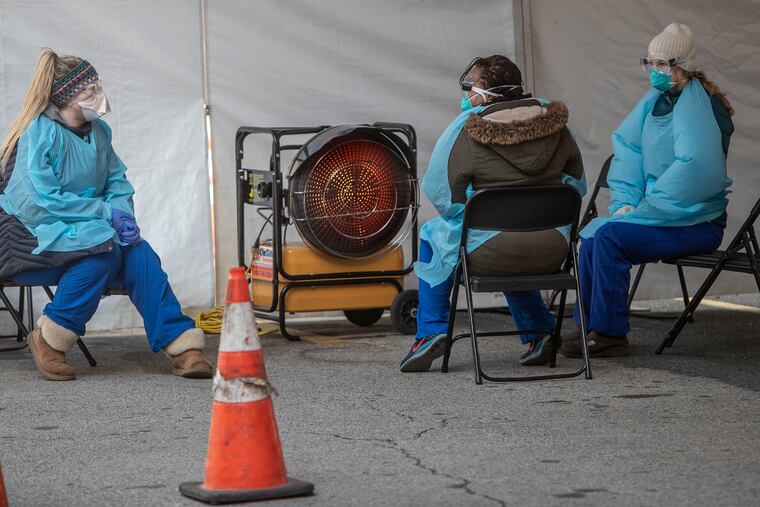New coronavirus tests could be powerful tools to manage the pandemic — if they work
Coronavirus diagnostic testing hasn't stopped the surge. But new blood tests might help fight the pandemic.

A slew of new coronavirus tests is coming — and so is confusion about them.
Stephen Hahn, the U.S. Food and Drug Administration commissioner, didn’t help matters Thursday when he told CBS radio, “We’re going to announce today our first approval of a serology test that will, in laboratories, allow the labs to determine exposure in the antibodies.” A few moments later, he added that those serology tests “aren’t FDA approved. but we’ve given them the flexibility to go forward as long as they’ve done their own quality assurance."
Serology tests — so called because they examine the blood serum — could be transformative in managing the pandemic, if they work. In theory, the tests could help diagnose and even treat infections. The tests might also identify people who could safely go back to work, and answer questions about the transmissibility and lethality of the virus.
But just like the laborious, time-consuming molecular tests that have been used worldwide to diagnose the coronavirus over the last three months, the serology versions are fraught with unknowns and pitfalls. Here is an overview:
Immunology
When a virus invades the body, it starts producing telltale proteins, called antigens. The body’s disease-fighting immune system then produces antibodies that zero in on the antigens and neutralize the virus. That’s a bit of an oversimplification, but it’s what Hahn was referring to. Serology tests detect immune activation.
Rapid diagnostic tests, which use a sample of blood or another body fluid, look for antigens (think of the influenza and strep tests) or antibodies, (the HIV test), or both.
The implications
Numerous academic and commercial labs around the world have developed and validated serological antibody tests because of their potential to fill critical needs.
Last week, for example, researchers led by Florian Krammer at Mount Sinai’s Icahn School of Medicine, published instructions for making their antibody test to encourage its wide use.
» HELP US REPORT: Are you a health care worker, medical provider, government worker, patient, frontline worker or other expert? We want to hear from you.
Daniel Stadlbauer, a virologist in Krammer’s lab, said the first goal of testing is to recruit recovered COVID-19 patients to donate their blood so the antibody-laden plasma can be extracted and given to critically ill patients. Mount Sinai has so far given “convalescent plasma” to four patients.
Another goal is to screen workers, starting with health-care providers, to find those with enough antibodies to safely return to work.
“That could restart the economy,” he said. “There is already talk of ‘immunity passports’ in European countries."
Experts agree that serology tests could also identify people who lack immunity so they can be first in line for a vaccine, which could be available within 18 months. Ultimately, with population testing, called serosurveys, public health authorities could map the full scope of the pandemic and be on guard for resurgences.
China has begun doing such serosurveys. In the United States, United Biomedical is offering its antibody test, free, to all 8,000 resident of Telluride, the wealthy Colorado ski town where the company’s cofounders have a residence.
» READ MORE: Why a coronavirus vaccine may take 18 months to reach the public
Limitations
If serology tests are so quick and easy, why haven’t we been using them since the beginning of the pandemic?
One reason is that looking for secondary evidence of a disease-causing germ is tricky. Timing matters; if there aren’t enough antigens or antibodies to be detected, that can undermine the accuracy. Or, if the test isn’t precise enough in probing for a protein, it may detect antibodies to the wrong virus, a problem called cross-reaction. Coronaviruses that cause common colds can cross-react with tests for the new virus.
“There is a lot we don’t know about the immune response to the virus,” said Kelly Wroblewski, director of infectious-disease programs at the Association of Public Health Laboratories. “What antibody [level] is enough for immunity? We have to make some assumptions.”
“The clinical value of these tests is not known yet,” researchers wrote in the current issue of the Journal of the American Medical Association. There are “challenges such as cross-reactivity, and ... sometimes the test does not detect the virus when it is there.”
The Spanish government can attest. It bought and then withdrew 340,000 Chinese-made coronavirus antibody testing kits, deeming the test too inaccurate to use to diagnose patients. The maker, Bioeasy Technology, said it would replace some of the tests.
Until now, worldwide diagnosis of coronavirus has relied on time-consuming molecular tests that use PCR (polymerase chain reaction) to look for viral RNA in nasal swab samples. But even this highly sensitive technology isn’t perfect; in one Chinese study, 30% of infected patients got negative results.
Regulations
Over the last month, the FDA’s regulation of coronavirus testing has gone from restrictive (only the government’s test was initially authorized for emergency use) to liberal. Now, any lab or company that wants to roll out a molecular PCR test for coronavirus can do so as long as the maker submits data to the FDA for review within 15 days.
As for serology tests, the makers don’t even have to go through FDA review because the tests “are less complex than molecular tests and are solely used to identify antibodies to the virus.” Makers still have to validate their serology tests, notify the FDA, and include warnings that the results “should not be used as the sole basis” for a diagnosis.
Nonetheless, Cellex, a North Carolina company, went through FDA review and got an emergency authorization, issued Wednesday, for its serology test. Cellex is the “first approval of a serology test” that Hahn referred to.